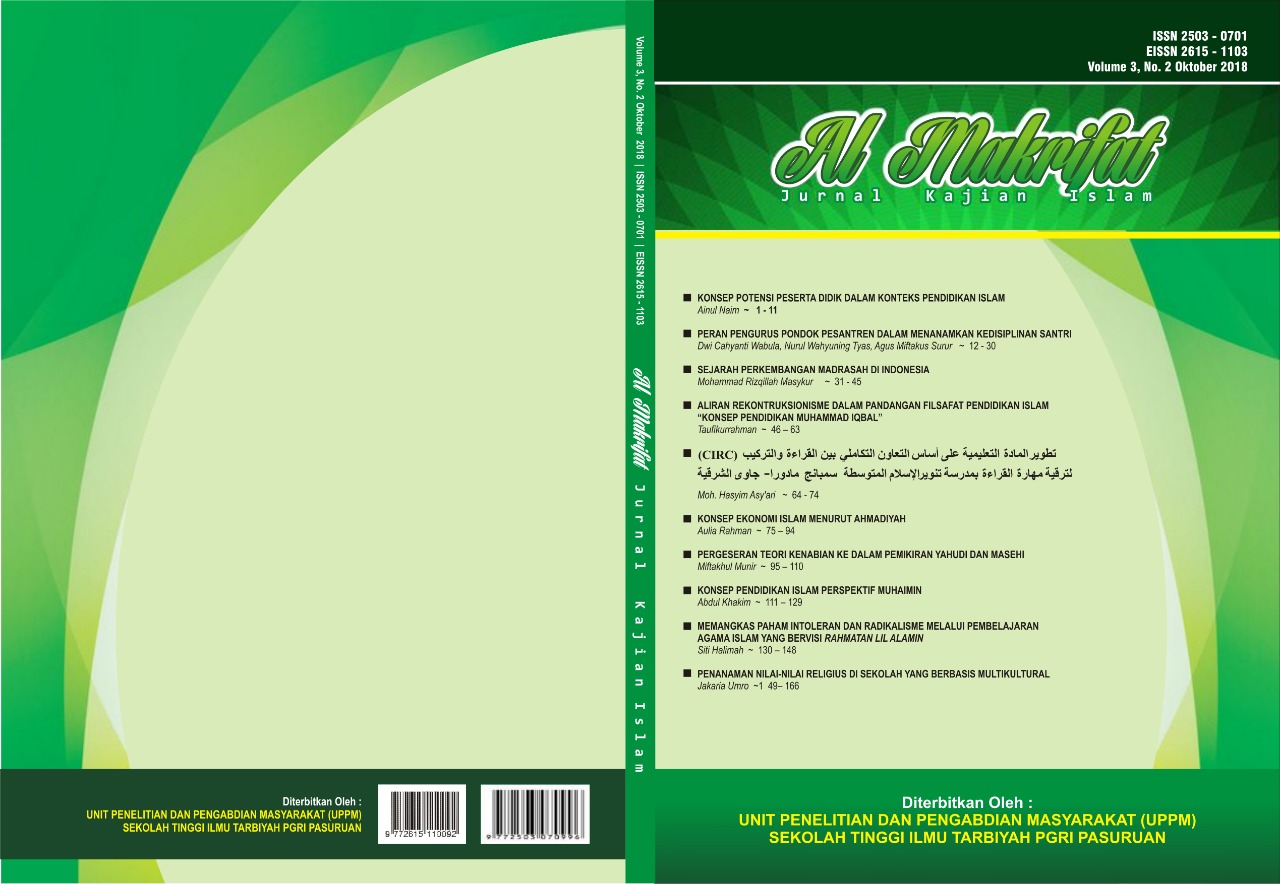Memangkas Paham Intoleran dan Radikalisme melalui Pembelajaran Agama Islam yang Bervisi Rahmatan Lil Alamin
Memangkas Paham Intoleran dan Radikalisme melalui Pembelajaran Agama Islam yang Bervisi Rahmatan Lil Alamin
Abstract
The Unitary State of the Republic of Indonesia was built by the community with an awareness of maintaining unity and unity as in the Pancasila and the 1945 Constitution. But in modern times the stage of life of the Indonesian state is increasingly crowded with various problems of statehood. One of the most dangerous problems is the emergence of intolerance and radicalism that can undermine the value of unity and unity. Intolerance and radicalism are one of the real threats to the life of the global world. The impact of this understanding can have implications for economic and political dynamics that can experience not small shocks, so as to create a sense of insecurity in the wider community through BOM terror that is rife with discussion and other acts of violence. Violence in the name of religion / belief, especially in the Islamic religion which is often associated with the realm of intolerance and radicalism. Intolerant attitudes arise because of several things. Comprehensive understanding of religion and beliefs and interpretations that can trigger intolerance. Differences are considered a threat, and differences must be opposed, there is no tolerance for differences. Both in terms of politics and advances in internet technology become one of the propaganda tools of intolerance. Content on social media that can be accessed freely becomes a catalyst for certain people or groups to foster intolerance. Resistance to the state from its members here is radically performed individually or in groups that are usually organized. In the end, it seems that understanding or the flow of radicalism is inevitably forced to be hostile to members of its own community. Such violence against the state and the wider community can be translated as radical individual or group violence with the lure of expanding its group network to a wider range that moves to target grassroots communities, whether young or old generation with a variety of motives such as social, political and the economy is packaged in religious dress. So finally the religion was accused of being a radical radical motive for targeting the grassroots at the same time at the same time disrupting the security and stability of the country's social and political stability. So, from that to cut intolerance and radicalism in the next generation. The presence of Islam is very helpful to build a world that "Rahmatan Lil Alamin" which is love for all nature does not look at differences and create a sense of peace. The vision of Islam can be implied by an educator to the first generation of the nation, namely children in the study of Islamic religious education. Besides that, it is necessary to cooperate with the state apparatus in enforcing a firm and strong law against intolerant acts and radicalism towards diversity, both in terms of religion, culture and politics, absolutely necessary.References
Al-Qardawi, Yusuf. 1997. Pro Kontra Al-Ghazali. Surabaya : Risalah Gusti.
Arifin. 2003. Ilmu Pendidikan Islam. Jakarta : PT. Bumi Aksara.
Fu’ad ‘Abd. al-BÄqy, Muhammad. 1992. al-Mu’jam al-Mufahras li AlfÄzh al-Qur’Än al-KarÄ«m, BairÅ«t: DÄr al-Fikr.
H., Sudarto. 1999. Konflik Islam Kristen : Menguak Akar Masalah Hubungan Antar Umat Beragamadi Indonesia. Semarang : Pustaka Rizqi Putra.
Irewati Afadlal, Awani, dkk. 2004. Islam dan Radikalisme di Indonesia. Jakarta : LIPI Press.
Ismail, Nawari. 2010. Pergumulan Dakwah Islam dalam Konteks Sosial Budaya, Analisis Kasus Dakwah. Yogyakarta : Pustaka Book Publisher.
Katili, D. Lukman, dkk. 2010. Pengembangan Kepribadian Pendidikan Agama Islam. Gorontalo : Akasya.
Mas’oed, Mohtar. 2001. Radikalisme Kolektif: Kondisi dan Pemicu. Yogyakarta : P3PK UGM.
Muhaimin. 2005. Paradigma Pendidikan Islam. Bandung : PT. Remaja Rosdakarya.
Natsir, Muhammad. 1970. Keragaman Hidup Antar Agama. Jakarta : Penerbit Hudaya.
Razak, Nasruddin.1986. Dhinul Islam. Bandung : Al-Ma’arif.
W.Kusumah, Mulyana. 2002. Terorisme dalam Perspektif Politik dan Hukum, Jurnal Kriminologi Indonesia FISIP UI, vol 2 no III. Jakarta :Terbit Terang.




